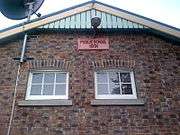Keiraville, New South Wales
| Keiraville Wollongong, New South Wales | |||||||||||||
|---|---|---|---|---|---|---|---|---|---|---|---|---|---|
|
Wollongong Botanic Garden | |||||||||||||
| Coordinates | 34°23′S 150°52′E / 34.383°S 150.867°ECoordinates: 34°23′S 150°52′E / 34.383°S 150.867°E | ||||||||||||
| Population | 3,070 (2006)[1] | ||||||||||||
| • Density | 930/km2 (2,410/sq mi) | ||||||||||||
| Postcode(s) | 2500 | ||||||||||||
| Area | 3.3 km2 (1.3 sq mi) | ||||||||||||
| Location | 3 km (2 mi) from Wollongong | ||||||||||||
| LGA(s) | City of Wollongong | ||||||||||||
| State electorate(s) | Keira | ||||||||||||
| Federal Division(s) | Cunningham | ||||||||||||
| |||||||||||||
Keiraville is an inner suburb of the city of Wollongong, New South Wales, Australia in the Illawarra region. It is situated in the foothills of Mount Keira, approximately three kilometres northwest of Wollongong.
Description
Keiraville has a public school (the Keiraville Public School[2]), post office and several shops located on Gipps Road.
Keiraville (and its neighbour Gwynneville) is known as a university town, home to the main campus of the University of Wollongong.
Another major landmark, Wollongong Botanic Garden, is situated between Northfields Avenue and Murphys Avenue, and includes the Wollongong Conservatorium of Music.
See also
References
- ↑ Australian Bureau of Statistics (25 October 2007). "Keiraville (State Suburb)". 2006 Census QuickStats. Retrieved 2008-01-16.
- ↑
External links

Original Keiraville Public School building
This article is issued from Wikipedia - version of the 7/2/2016. The text is available under the Creative Commons Attribution/Share Alike but additional terms may apply for the media files.